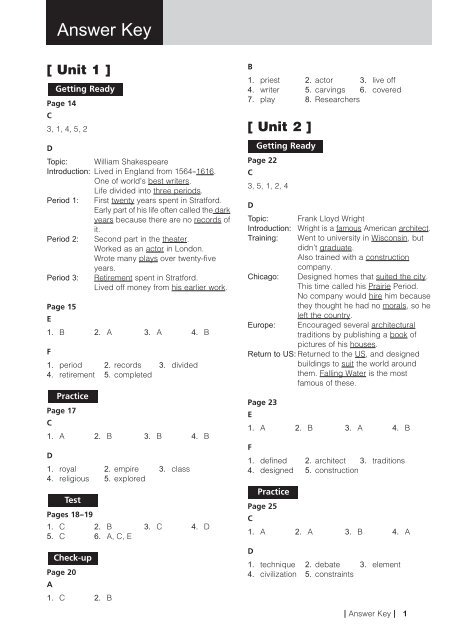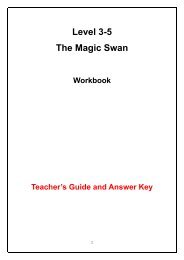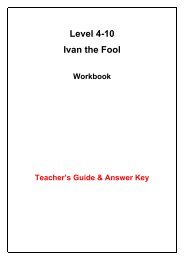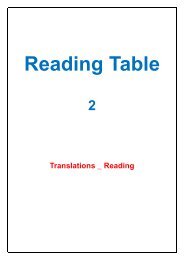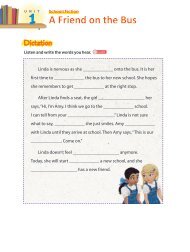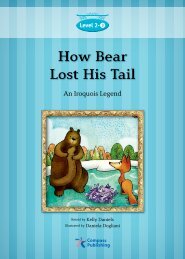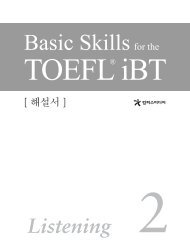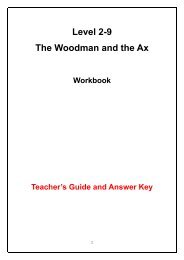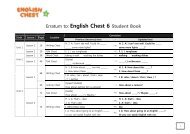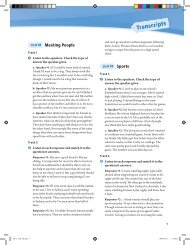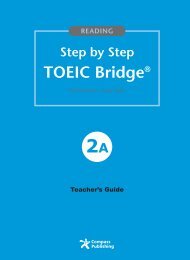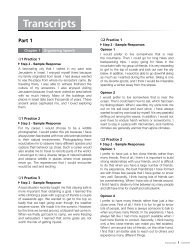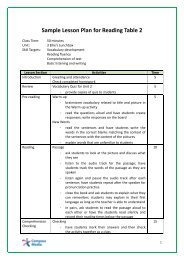Basic Skills for the TOEFL iBT 2
Basic Skills for the TOEFL iBT 2
Basic Skills for the TOEFL iBT 2
You also want an ePaper? Increase the reach of your titles
YUMPU automatically turns print PDFs into web optimized ePapers that Google loves.
Answer Key<br />
[ Unit 1 ]<br />
Getting Ready<br />
Page 14<br />
C<br />
3, 1, 4, 5, 2<br />
D<br />
Topic: William Shakespeare<br />
Introduction: Lived in England from 1564--1616.<br />
One of world’s best writers.<br />
Life divided into three periods.<br />
Period 1: First twenty years spent in Strat<strong>for</strong>d.<br />
Early part of his life often called <strong>the</strong> dark<br />
years because <strong>the</strong>re are no records of<br />
it.<br />
Period 2: Second part in <strong>the</strong> <strong>the</strong>ater.<br />
Worked as an actor in London.<br />
Wrote many plays over twenty-five<br />
years.<br />
Period 3: Retirement spent in Strat<strong>for</strong>d.<br />
Lived off money from his earlier work.<br />
Page 15<br />
E<br />
1. B 2. A 3. A 4. B<br />
F<br />
1. period 2. records 3. divided<br />
4. retirement 5. completed<br />
Practice<br />
Page 17<br />
C<br />
1. A 2. B 3. B 4. B<br />
D<br />
1. royal 2. empire 3. class<br />
4. religious 5. explored<br />
Test<br />
Pages 18--19<br />
1. C 2. B 3. C 4. D<br />
5. C 6. A, C, E<br />
Check-up<br />
Page 20<br />
A<br />
1. C 2. B<br />
B<br />
1. priest 2. actor 3. live off<br />
4. writer 5. carvings 6. covered<br />
7. play 8. Researchers<br />
[ Unit 2 ]<br />
Getting Ready<br />
Page 22<br />
C<br />
3, 5, 1, 2, 4<br />
D<br />
Topic:<br />
Introduction:<br />
Training:<br />
Chicago:<br />
Europe:<br />
Frank Lloyd Wright<br />
Wright is a famous American architect.<br />
Went to university in Wisconsin, but<br />
didn’t graduate.<br />
Also trained with a construction<br />
company.<br />
Designed homes that suited <strong>the</strong> city.<br />
This time called his Prairie Period.<br />
No company would hire him because<br />
<strong>the</strong>y thought he had no morals, so he<br />
left <strong>the</strong> country.<br />
Encouraged several architectural<br />
traditions by publishing a book of<br />
pictures of his houses.<br />
Return to US: Returned to <strong>the</strong> US, and designed<br />
buildings to suit <strong>the</strong> world around<br />
<strong>the</strong>m. Falling Water is <strong>the</strong> most<br />
famous of <strong>the</strong>se.<br />
Page 23<br />
E<br />
1. A 2. B 3. A 4. B<br />
F<br />
1. defined 2. architect 3. traditions<br />
4. designed 5. construction<br />
Practice<br />
Page 25<br />
C<br />
1. A 2. A 3. B 4. A<br />
D<br />
1. technique 2. debate 3. element<br />
4. civilization 5. constraints<br />
| Answer Key | 1
Answer Key<br />
Test<br />
Pages 26--27<br />
1. A 2. C 3. A 4. C<br />
5. D 6. B, C, E<br />
Check-up<br />
Page 28<br />
A<br />
1. B 2. A<br />
B<br />
1. hire 2. spire 3. stories<br />
4. moral 5. suited 6. influential<br />
7. impractical 8. antenna<br />
[ Unit 3 ]<br />
Getting Ready<br />
Page 30<br />
C<br />
3, 2, 1, 4, 5<br />
D<br />
Topic: Plant Development<br />
Introduction: Study of plant development called<br />
botany.<br />
Plants begin as seeds.<br />
Roots grow downward from seeds.<br />
Roots: Roots grow in soil or water.<br />
They provide plants with nutrients and<br />
water.<br />
They hold plant in <strong>the</strong> ground.<br />
Stem: Stems develop upward from seeds.<br />
They keep plant leaves away from<br />
some insects and animals.<br />
They bring nutrients from <strong>the</strong> roots to<br />
<strong>the</strong> leaves.<br />
Leaves: Leaves make food from sunlight, CO2,<br />
and water.<br />
The food is sugar and oxygen.<br />
Seeds: Plants must be pollinated to make<br />
seeds.<br />
Colorful, nice-smelling flowers attract<br />
pollinators to distribute pollen.<br />
Page 31<br />
E<br />
1. A 2. B<br />
2 | Answer Key |<br />
F<br />
1. investigation 2. botany 3. distributed<br />
4. absorbs 5. established<br />
Page 33<br />
C<br />
1. B 2. B 3. A<br />
D<br />
1. obtained 2. maintenance 3. emerged<br />
4. regions 5. distinct<br />
Pages 34--35<br />
1. D 2. D 3. D 4. B<br />
5. D 6. A, D, E<br />
Check-up<br />
Page 36<br />
A<br />
1. C 2. B<br />
B<br />
1. corpse 2. Nutrients 3. germinate<br />
4. nickname 5. cultivation 6. de<strong>for</strong>estation<br />
7. development 8. pollinate<br />
[ Unit 4 ]<br />
Getting Ready<br />
Page 38<br />
C<br />
3, 5, 2, 1, 4<br />
D<br />
Topic:<br />
Size:<br />
Importance:<br />
Parts:<br />
The Atom<br />
Grain of sand has a lot of atoms.<br />
Atoms are <strong>the</strong> foundation of all things.<br />
Atom has three parts.<br />
Protons have a positive charge.<br />
Neutrons have a neutral charge.<br />
Electrons have a negative charge.<br />
Identification: The number of protons specifies<br />
what an atom is.<br />
Number of protons is called <strong>the</strong> atomic<br />
number.<br />
Core:<br />
Practice<br />
Test<br />
The core has protons and neutrons.<br />
Electrons orbit around core.
Page 39<br />
E<br />
1. A 2. A 3. A 4. B<br />
F<br />
1. dense 2. atom 3. approximately<br />
4. specifies 5. foundation<br />
Practice<br />
Page 41<br />
C<br />
1. A 2. B 3. A<br />
D<br />
1. invisible 2. react 3. occur<br />
4. associated 5. reaction<br />
Test<br />
Pages 42--43<br />
1. A 2. D 3. B 4. D<br />
5. C 6. B, C, E<br />
Check-up<br />
Page 44<br />
A<br />
1. C 2. A<br />
B<br />
1. positive charge 2. bubbles 3. grains<br />
4. laboratories 5. atomic 6. weak<br />
7. dissolve 8. negative charge<br />
[ Unit 5 ]<br />
Getting Ready<br />
Page 46<br />
C<br />
3, 2, 1. 4<br />
D<br />
Topic:<br />
Introduction:<br />
All year:<br />
Seasonal Businesses<br />
Makes money at certain times of<br />
year.<br />
Some stay open all year.<br />
Make most money in one season.<br />
Try to boost sales in off-season.<br />
Off-season:<br />
Staff:<br />
Page 47<br />
E<br />
1. D 2. C<br />
Some close during off-season.<br />
Doesn’t make sense to stay open.<br />
Not worth <strong>the</strong> expense.<br />
Summer businesses---employ students.<br />
Winter businesses---hard to find staff.<br />
F<br />
1. employ 2. typical 3. expenses<br />
4. staff 5. seasonal<br />
Practice<br />
Page 49<br />
C<br />
1. B 2. A 3. B<br />
D<br />
1. budget 2. competitor 3. persuade<br />
4. alternatively 5. finances<br />
Test<br />
Pages 50--51<br />
1. D 2. A 3. C 4. B<br />
5. A 6. A, C, D<br />
Check-up<br />
Page 52<br />
A<br />
1. D<br />
B<br />
1. off-season 2. stick 3. make sense<br />
4. luck 5. during 6. goods<br />
7. boost 8. early on<br />
[ Unit 6 ]<br />
Getting Ready<br />
Page 54<br />
C<br />
2, 1, 5, 4, 3<br />
| Answer Key | 3
Answer Key<br />
D<br />
Topic:<br />
Introduction:<br />
Composition:<br />
Geology<br />
Studies physical aspects of <strong>the</strong><br />
Earth.<br />
Looks at materials and what happens<br />
to <strong>the</strong>m.<br />
Earth made of rocks.<br />
Rocks made of minerals.<br />
Minerals have consistent<br />
composition.<br />
Types of rocks: Three types of rock.<br />
Different textures and minerals.<br />
Change via <strong>the</strong> rock cycle.<br />
Study rocks to: Geologists identify rocks to learn<br />
history.<br />
Look at changes in land<strong>for</strong>ms.<br />
Learn:<br />
Page 55<br />
E<br />
1. A, B, D<br />
Learn about living things by looking<br />
at fossils.<br />
F<br />
1. aspect 2. identify 3. physical<br />
4. geology 5. consistent<br />
Practice<br />
Page 57<br />
C<br />
1. B, D, E 2. C<br />
D<br />
1. considerable 2. continent 3. range<br />
4. apart 5. consequence<br />
Test<br />
Pages 58--59<br />
1. C 2. A 3. B 4. D<br />
5. C 6. A, C, E<br />
Check-up<br />
Page 60<br />
A<br />
1. B<br />
B<br />
1. melts 2. eruption 3. minerals<br />
4. composition 5. texture 6. upward<br />
7. land<strong>for</strong>ms 8. edge<br />
4 | Answer Key |<br />
[ Review 1 ]<br />
Reading 1<br />
Pages 61--62<br />
1. C 2. D 3. A 4. B<br />
5. B 6. A<br />
Reading 2<br />
Pages 63--64<br />
1. C 2. B 3. C 4. C<br />
5. C 6. A<br />
Reading 3<br />
Pages 65--66<br />
1. B 2. B 3. B<br />
4. C 5. C<br />
6.<br />
Chemical properties of gold<br />
• (A) Made of atoms<br />
• (D) Kind of metal<br />
• (E) One of 117 elements<br />
Uses of gold<br />
• (B) Makes jewelry<br />
• (F) Trade and coinage<br />
[ Unit 7 ]<br />
Getting Ready<br />
Page 68<br />
C<br />
3, 4, 2, 1<br />
D<br />
Topic:<br />
Introduction:<br />
Poems:<br />
Philosophy:<br />
William Wordsworth<br />
Famous English poet.<br />
Born 1770 and died 1850.<br />
Grew up in beautiful Lake District.<br />
Wanted to celebrate England’s beauty.<br />
Wrote about flowers, birds, lakes,<br />
and old buildings.<br />
His poems caused a shift.<br />
Reacted against idea that feelings<br />
not important.<br />
Believed emotions and feelings most<br />
important.<br />
Famous work: Poem called The Prelude.<br />
Published after his death.<br />
Poem tells why Wordsworth became<br />
a poet.<br />
Starts---He’s a boy.<br />
Finishes---He’s an adult.
Page 69<br />
E<br />
1. A 2. A 3. B 4. A<br />
F<br />
1. shift 2. approach 3. philosophy<br />
4. celebrated 5. stated<br />
Causes:<br />
Result:<br />
Solutions:<br />
De<strong>for</strong>estation is caused by large<br />
companies and poor farmers.<br />
De<strong>for</strong>estation results in poor air<br />
quality and loss of potential<br />
knowledge.<br />
Don’t support companies that<br />
harm <strong>the</strong> rain<strong>for</strong>est.<br />
Programs to end poverty.<br />
Practice<br />
Page 71<br />
C<br />
1. B 2. B 3. B, C, E<br />
D<br />
1. assumed 2. realize 3. pride<br />
4. demonstrated 5. prejudice<br />
Test<br />
Pages 72--73<br />
1. B 2. B 3. A 4. C<br />
5. C 6. B, D, E<br />
Check-up<br />
Page 74<br />
A<br />
1. D 2. C<br />
B<br />
1. rude 2. explain 3. poet<br />
4. District 5. prelude 6. liar<br />
7. poem 8. novel<br />
[ Unit 8 ]<br />
Getting Ready<br />
Page 76<br />
C<br />
5, 1, 4, 2, 3<br />
Page 77<br />
E<br />
1. B 2. B 3. A 4. A<br />
F<br />
1. poverty 2. extinct 3. program<br />
4. habitat 5. species<br />
Practice<br />
Page 79<br />
C<br />
1. A 2. B 3. B 4. B<br />
D<br />
1. fund 2. campaign 3. rely<br />
4. consume 5. conserve<br />
Test<br />
Pages 80--81<br />
1. B 2. A 3. D 4. C<br />
5. B 6. A, C, E<br />
Check-up<br />
Page 82<br />
A<br />
1. D 2. A<br />
B<br />
1. filter 2. harm 3. as such<br />
4. limiting 5. threat 6. cut back<br />
7. rain<strong>for</strong>ests 8. endanger<br />
D<br />
Topic:<br />
Introduction:<br />
De<strong>for</strong>estation<br />
Trees keep <strong>the</strong> air clean.<br />
Trees filter pollution from <strong>the</strong> air.<br />
The loss of trees affects <strong>the</strong><br />
climate.<br />
Negative effects: De<strong>for</strong>estation damages animal<br />
habitats.<br />
Many animals may become extinct.<br />
[ Unit 9 ]<br />
Getting Ready<br />
Page 84<br />
C<br />
2, 1, 3, 4<br />
| Answer Key | 5
Answer Key<br />
D<br />
Topic: The Importance of Sleep<br />
Introduction: One third of our lives spent sleeping.<br />
Need it to work properly.<br />
Less than adequate = problems when<br />
awake.<br />
Amount needed:<br />
Amount of sleep needed varies.<br />
Average is eight hours.<br />
Reasons needed:<br />
Sleep affects health and well-being.<br />
Tired people can’t concentrate and may<br />
become emotional.<br />
This makes it harder to sleep.<br />
Effects: Lack of sleep results in headaches and<br />
coordination problems.<br />
Sleep makes us faster and stronger.<br />
Helps our immune system keep us from<br />
getting sick.<br />
Page 85<br />
E<br />
1. B 2. A<br />
F<br />
1. concentrate 2. coordination 3. vary<br />
4. constitutes 5. adequate<br />
Practice<br />
Page 87<br />
C<br />
1. B 2. A 3. B<br />
D<br />
1. involve 2. attitudes 3. negative<br />
4. feature 5. insisting<br />
Test<br />
Pages 88--89<br />
1. A 2. D 3. A 4. B<br />
5. A 6. B, D, E<br />
Check-up<br />
Page 90<br />
A<br />
1. B 2. D<br />
B<br />
1. immune system 2. calories 3. well-being<br />
4. fast food 5. disturbed 6. overweight<br />
7. popularity 8. awake<br />
[ Unit 10 ]<br />
Getting Ready<br />
Page 92<br />
C<br />
2, 1, 3, 4, 5<br />
D<br />
Topic:<br />
In <strong>the</strong> past:<br />
Film cameras:<br />
Digital Cameras<br />
Be<strong>for</strong>e digital cameras---purchase<br />
film, load it, take pictures.<br />
Couldn’t see <strong>the</strong>m.<br />
After taking pictures---wind up film,<br />
take it out, and have it developed.<br />
Digital cameras: Digital cameras breakthrough in<br />
technology.<br />
No film.<br />
Store photos like a computer.<br />
Today:<br />
Conclusion:<br />
Today---cheap and easy.<br />
See photos immediately.<br />
Put <strong>the</strong>m on computers.<br />
Share via email and websites.<br />
Consumers prefer digital to film.<br />
Page 93<br />
E<br />
1. B 2. A 3. B 4. B<br />
F<br />
1. Prior 2. consumers 3. digital<br />
4. purchase 5. breakthrough<br />
Practice<br />
Page 95<br />
C<br />
1. B 2. B 3. A<br />
D<br />
1. acquire 2. primary 3. bulky<br />
4. multimedia 5. collections<br />
Test<br />
Pages 96--97<br />
1. D 2. C 3. D 4. C<br />
5. A 6. A, C, D<br />
6 | Answer Key |
Check-up<br />
Page 98<br />
A<br />
1. B 2. D<br />
B<br />
1. memory 2. developed 3. load<br />
4. hard drive 5. film 6. portable<br />
7. wind 8. album<br />
[ Unit 11 ]<br />
Getting Ready<br />
Page 100<br />
C<br />
3, 1, 4, 2<br />
D<br />
Topic:<br />
Introduction:<br />
Details:<br />
Democracy<br />
Originated in ancient Greece.<br />
Rule by <strong>the</strong> people.<br />
No dictator---no one with authority<br />
to rule over everyone.<br />
Ancient Greece: Ancient Greeks---practiced direct<br />
democracy.<br />
All citizens could take part.<br />
Slaves and women not citizens.<br />
Today:<br />
Page 101<br />
E<br />
1. B 2. D<br />
Today---elect representatives.<br />
They represent voters.<br />
F<br />
1. governed 2. authority 3. originated<br />
4. assembly 5. democracy<br />
Practice<br />
Page 103<br />
C<br />
1. D 2. B 3. B<br />
D<br />
1. branches 2. function 3. legislation<br />
4. individual 5. Congress<br />
Test<br />
Pages 104--105<br />
1. D 2. A 3. C 4. C<br />
5. B 6. A, C, E<br />
Check-up<br />
Page 106<br />
A<br />
1. B<br />
B<br />
1. citizen 2. dictator 3. cabinet<br />
4. practice 5. executive 6. Supreme Court<br />
7. ruled 8. judicial<br />
[ Unit 12 ]<br />
Getting Ready<br />
Page 108<br />
C<br />
3, 2, 1, 4<br />
D<br />
Topic:<br />
Body Language<br />
Communication: Two kinds---verbal and non-verbal.<br />
Verbal: Uses words.<br />
Non-verbal: Uses gestures and facial<br />
expressions.<br />
Also called body language.<br />
Makes up fifty-five percent of<br />
communication.<br />
Positive body language: Sends happy messages.<br />
Examples: Smiles look friendly.<br />
Standing straight looks confident.<br />
Making eye contact gets attention.<br />
Negative body language: Sends bad messages.<br />
Examples: Crossing arms looks angry.<br />
Frowning looks worried.<br />
Looking down looks shy.<br />
Looking away looks bored.<br />
Page 109<br />
E<br />
1.<br />
Verbal communication<br />
• (C) Communication by talking<br />
• (D) Uses words<br />
Nonverbal communication<br />
• (A) Uses gestures and facial expressions<br />
• (F) Makes up fifty-five percent of communication<br />
• (G) Shown with <strong>the</strong> body<br />
| Answer Key | 7
Answer Key<br />
2.<br />
Positive body language<br />
• (B) Smiling<br />
• (E) Making eye contact<br />
• (H) Standing straight<br />
Negative body language<br />
• (A) Crossing arms<br />
• (C) Looking away<br />
• (F) Frowning<br />
• (G) Looking down<br />
F<br />
1. gestures 2. nonverbal 3. confident<br />
4. contact 5. verbal<br />
Practice<br />
Page 111<br />
C<br />
1.<br />
They avoid<br />
• (B) Saying words that make <strong>the</strong>m stutter<br />
• (E) Public speaking<br />
They feel<br />
• (A) Nervous<br />
• (C) Stupid<br />
• (F) Shy<br />
2. D<br />
D<br />
1. awkward 2. concentrate 3. speech<br />
4. perceived 5. public speaking<br />
Test<br />
Pages 112--113<br />
1. B 2. C 3. B<br />
4. A 5. B<br />
6.<br />
Should do in public speaking<br />
• (B) Practice your speech<br />
• (F) Study your subject<br />
• (G) Make cards with key words<br />
• (H) Stand straight<br />
Check-up<br />
Page 114<br />
A<br />
1. A<br />
B<br />
1. stutter 2. impediment<br />
3. expression 4. hard time<br />
5. avoid 6. body language<br />
7. communication 8. frown<br />
[ Review 2 ]<br />
Reading 1<br />
Pages 115--116<br />
1. B 2. C 3. C 4. C<br />
5. A 6. D<br />
Reading 2<br />
Pages 117--118<br />
1. A 2. D 3. D 4. C<br />
5. D 6. B<br />
Reading 3<br />
Pages 119-120<br />
1. D 2. D 3. A<br />
4. C 5. A<br />
6.<br />
Primary use of phone<br />
• (C) Make calls<br />
• (D) Receive calls<br />
Optional use of phone<br />
• (B) Listen to music<br />
• (E) Take pictures<br />
• (G) Personal planner<br />
Shouldn’t do in public speaking<br />
• (A) Use big words<br />
• (D) Speak softly<br />
• (I) Speak quickly<br />
8 | Answer Key |


